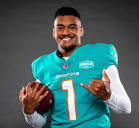Concussion protocol is a hot topic in multiple sports recently. NASCAR has come under fire for driver injuries with prolonged concussion symptoms from wrecks that don’t look that bad. Most notably, Kurt Busch has missed 14 weeks of racing and had to remove himself from playoff contention due to his injury in from a crash during qualifying at Pocono. Alex Bowman is out for the second week in a row since his wreck at Texas and is out of the playoffs. The NFL has faced backlash recently for the potential misdiagnosis and subsequent further injury sustained by Tua Tagovailoa, Miami Dolphins quarterback injured during the September 25th game against the Bills. The way these two sports responded to injury and moved forward vary widely and are a source of contention for fans of either.
Diagnosis
The medical diagnosis tool used by most in-the-field physicians to diagnosis concussions is referred to as SCAt-5. SCAt-5 is made up of Symptom Scale, Immediate Memory, Concentration – Digits Backward, Tandem Gait, and a Modified Balance Error Scoring System test. (For in-depth information on SCAt-5, check out https://scat5.cattonline.com/.) While some of the questions on the PDF available on the SCAt-5 website are contact-sport-specific, the basics remain the same. Drivers would rate their symptoms on a scale of 0-6 (none to severe) for things such as headache, blurred vision, sensitivity to light or noise, sadness, anxiousness, fatigue, and irritability. The physician conducts memory tests with 5-word lists that the driver repeats, a concentration test of repeating information back in reverse order from presentation (for example, 1-2-3 is given and the driver replies 3-2-1), and assesses orientation and balance in the tandem gait and mBESS tests. Red flags that medical staff will look for include neck pain, weakness or tingling in the extremities, seizure or convulsion, vomiting, or increased agitation, among other symptoms. These are looked for at the time of injury, as well as for the next 24-48 hours.
NASCAR’s protocol
NASCAR made a significant update to their concussion protocol in 2013 and expanded it in 2017 with the update to SCAt. Part of this update included the requirement that neurologists providing post-injury clearance to drivers must be board certified and have at least five years’ experience with sports related injuries. The better news is, drivers are more vocal on their injuries than in years’ past, which means Kurt Busch and Alex Bowman can continue to receive the care they need to return to racing soon. Prior to this, drivers were better able to mask or downplay symptoms and return to racing before they should, resulting in additional or compounding injuries.


NFL’s protocol
The NFL consistently updates their concussion protocol. In Tua’s case, his concussion symptoms were also potential symptoms from his previous back injury and were potentially misattributed. Regardless of the cause of his symptoms, Tua should not have been released to return to the game. What makes NFL stand apart in this instance is their swift response to this specific set of circumstances. Within two weeks, officials announced an amendment – effective immediately – that would add ataxia (abnormality of balance/stability, motor coordination, or dysfunctional speech) to a list of Red Flag Symptoms that would sideline players.

NASCAR responds
NASCAR’s response to repeated concussions? Meetings where drivers say they didn’t feel heard, both before and during that meeting. Finally, a press release came saying changes would be made to the rear of the Next Gen cars for the 2023 season. Some drivers have even spoken out in favor of the announcements made by NASCAR President Steve Phelps regarding changes to come, including weekly driver safety meetings which can go a long way in making drivers feel heard. Fortunately, there were no injuries reported from the Charlotte Roval. That still means making it through four more races before the end of the season. One can only hope that the changes made during the offseason will be sufficient to prevent further concussion injuries. This won’t help Kurt Busch and Alex Bowman this season, but hopefully will protect drivers in future seasons.
Future concerns
The future of anyone who has suffered a concussion depends on the severity of the brain injury as well as the frequency. A single mild concussion typically resolves of all symptoms within a few weeks. Multiple concussions, even those labeled mild, have a cumulative effect on the brain similar to moderate or severe traumatic brain injuries. Concussions can lead to post-concussion syndrome or chronic traumatic encephalopathy (CTE). Long term effects of CTE may include memory loss, dementia, chronic migraines, personality changes (aggression, anxiety, depression, suicidal ideation, loss of impulse control), seizures, visual changes, paralysis, Parkinson’s Disease, Alzheimer’s Disease, sleep disturbances (possibly even triggering latent narcolepsy to become active), or smell and taste dysfunction. Diseases like narcolepsy and Parkinson’s Disease will often present with some of the other symptoms of CTE. Unfortunately, there is no cure for these diseases, so symptom management is the only course of action.
There have been many documented cases of concussions and TBIs leading to further medical concerns. For drivers like Busch and Bowman, continued monitoring of concussion symptoms should be part of their medical care plans going forward. It would not be surprising for Bowman to have some residual effects from his concussion. Busch may be facing the same health decisions Dale Jr. had to face in 2017 when his repeated concussions led to what most fans consider an early retirement. Dale Jr. went through significant physical therapy and rehabilitation to address the lingering symptoms he had from his repeated concussions. He reported symptoms like dizziness, blurred vision, and mood changes.

Busch has not been as forthcoming as Dale Jr. on the symptoms he’s experienced, but he has been vocal about his recovery process and updating the NASCAR world on whether he is able to return. He hasn’t provided an update since late August but is expected to make an announcement sometime between the Roval and Las Vegas. Racing fans are divided between Busch taking the rest of the season off and him announcing an early retirement due to lingering concussion symptoms. At this point, either is plausible. What matters most is that Busch is taking the time to recover and is following healthcare provider recommendations to bring about the best outcome possible. Now drivers and fans just hope that NASCAR will make appropriate changes to the Next Gen chassis to make it safer for drivers in 2023 and beyond. There’s no going back and protecting Kurt Busch and Alex Bowman, but changes put in place going forward can at least help prevent further issues.


